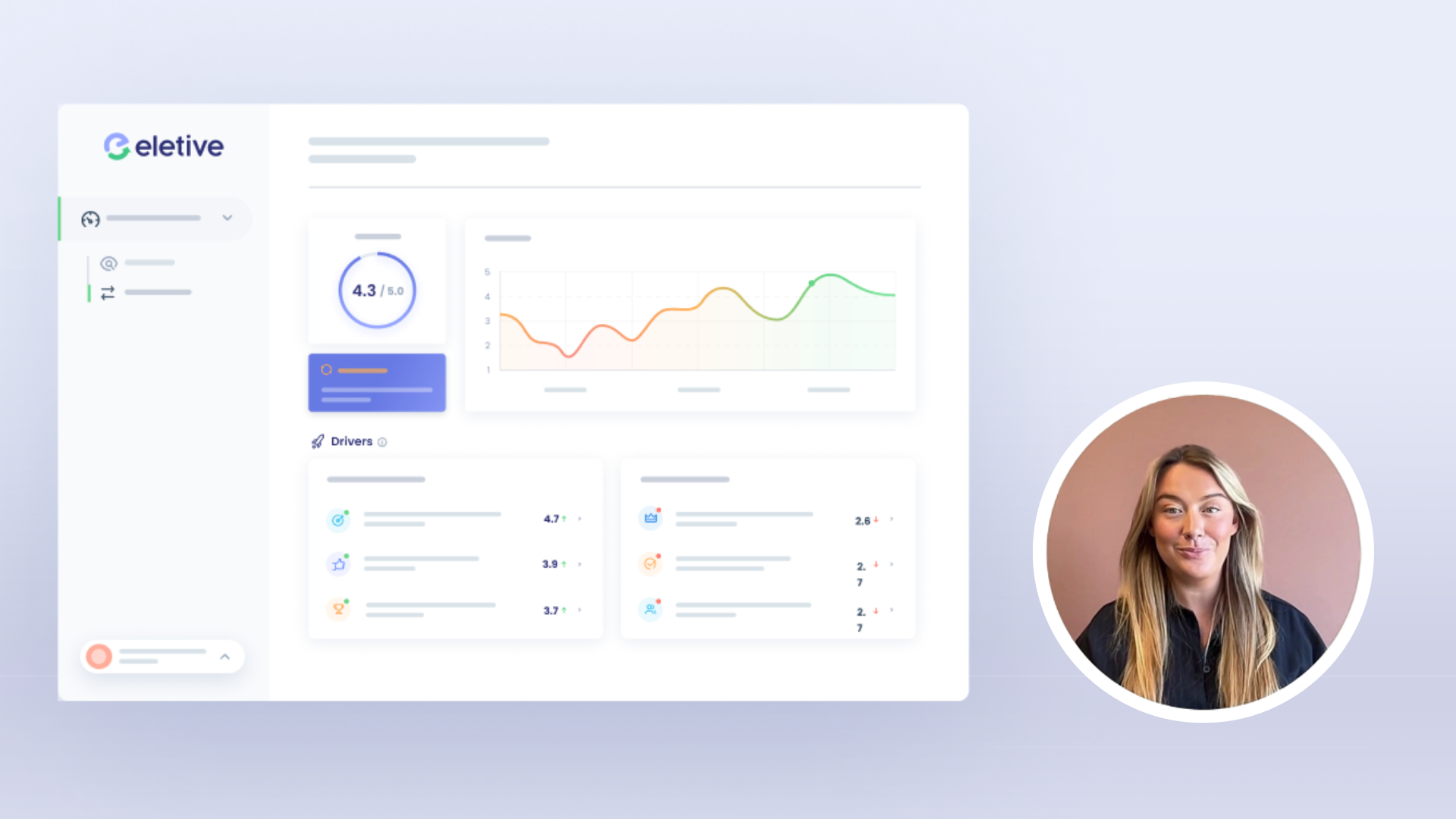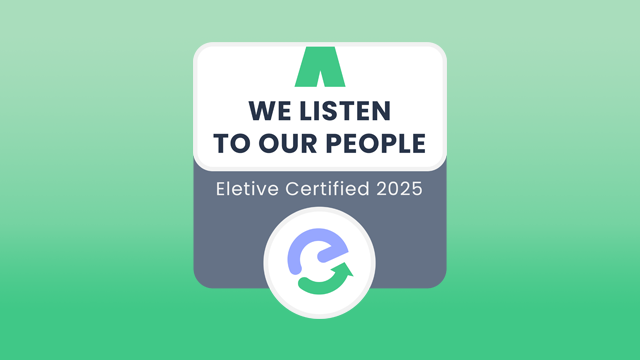Employee engagement in the healthcare industry is not just about making patients happy; it's about creating a work environment where healthcare professionals are passionate, dedicated, and highly committed.
In this article, we will explore the extraordinary power of employee engagement in healthcare and provide HR directors in the healthcare sector with five effective strategies to increase it.
What is employee engagement in healthcare?
Employee engagement in healthcare involves creating a workplace where staff are passionate about their roles, dedicated to the organisation's mission, and feel valued for their contributions.
It's more than just job satisfaction; it embodies commitment, enthusiasm, and discretionary effort that employees put into their work.
Gallup research suggests engaged teams show the following:
A 81% reduction in absenteeism
An 18% reduction in turnover for high turnover organisations
An 18% boost in productivity
So imagine what this can do for healthcare. In essence, higher levels of employee engagement could result in an enhanced quality of patient care.
A highly-engaged workforce doesn't just hit targets - it fosters an environment conducive to innovation and continual improvement. This sparks new ideas leading not only towards operational efficiencies but also advancements in medical treatments.
Why is employee engagement important in healthcare?
When healthcare workers are engaged, they're more invested in their work. This commitment often translates into improved performance. Another Gallup study, for instance, found that highly engaged units saw 41% fewer safety incidents. Patient care becomes less about ticking boxes and more about going above and beyond to ensure wellness.
A hospital or clinic doesn't operate independently from its workforce – rather, like how a clock cannot function without all its cogs working harmoniously together.
Increasing employee engagement in healthcare is about nurturing a workforce that cares deeply for their patients, feels valued within their roles, stays loyal to the organisation and drives it towards success. That's no small feat.
6 ways to increase employee engagement in healthcare
1. Use employee engagement surveys
Measuring employee engagement is the cornerstone of building a thriving workplace.
By gathering feedback through surveys, you gain valuable insights to understand your organisation's pulse.
This initial step is crucial in your journey towards enhancing engagement and fostering self-leadership.
Here's why it's essential:
Insightful data: Employee engagement surveys provide real-time insights into what's working and what isn't within your organisation, forming the foundation of your engagement strategies.
Performance enhancement: The survey data helps you create action plans and SMART goals, align teams, and track progress, supporting your leaders in achieving high performance.
Cultivate engagement: Employee engagement surveys empower your workforce to take ownership of their experience. By involving employees in action plans and providing guidance, you inspire self-leadership and shape a thriving workplace culture.
Gathering employee feedback through surveys is the pivotal first step to building self-leadership and enhancing engagement. It's about listening, understanding, and creating a thriving workplace.
With real-time pulse surveys, Eletive lets healthcare organisations glean real insights into the impact of their engagement activities. And you no longer have to run time intensive annual surveys to do this.
Related resource: The 65 most powerful pulse survey questions | Eletive
2. Implement employee engagement activities in healthcare
Peer acknowledgement - Encourage team members to acknowledge and appreciate each other's accomplishments and acts of kindness.
Employee-led learning sessions - Facilitate workshops and training sessions led by employees, sharing their expertise and passions.
Informal lunchtime learning - Host relaxed, lunchtime sessions for sharing insights on topics pertinent to healthcare.
Wellness competitions - Organise friendly contests centred around steps, healthy eating, or stress management, with rewards for participants.
Team briefings - Conduct brief daily or weekly gatherings to discuss patient care, provide updates, and offer a platform for team members to voice concerns and ideas.
Employee recognition events - Plan special occasions or activities dedicated to expressing gratitude to your healthcare staff.
Skill exchange days - Allow employees to teach one another skills or knowledge relevant to their roles.
Brainstorming for innovations - Create platforms for staff to brainstorm and share creative ideas for enhancing processes.
Employee-led social committees - Establish committees responsible for arranging social events, such as potlucks, team outings, or themed dress-up days.
Job shadowing opportunities - Enable team members to spend time shadowing colleagues in different roles to gain insights into their work.
3. Implement leadership best practices to improve employee engagement
Providing regular feedback
Effective leadership in healthcare involves providing regular feedback to team members. This feedback loop not only keeps employees informed about their performance but also demonstrates a genuine interest in their growth and success. With Eletive you can keep everyone accountable with 360-degree feedback.
Performance evaluations
Conducting periodic performance evaluations allows leaders to sit down with their team members to discuss their progress, set goals, and identify development opportunities. These evaluations shouldn't be approached as one-sided assessments; they should be collaborative discussions in which employees have the chance to share their perspectives, concerns, and aspirations.
This is an example of what a one-to-one meeting template, or a staff meeting template, can look like in Eletive:
ELETIVE ONE TO ONE MEETING:format(jpeg)/f/288714721386412/bd47d60672/eletive_one_to_one_meeting.jpg)
Conflict resolution
Leaders should be skilled in resolving conflicts and disagreements within the team. They can facilitate discussions, mediate disputes, and help find common ground. Addressing conflicts promptly can prevent them from escalating and negatively affecting morale and teamwork.
Open communication
Creating an environment where team members feel safe to express their concerns and grievances anonymously is essential. Leaders should encourage open and honest communication, allowing employees to share their viewpoints and feelings without fear of retribution. This fosters a culture of trust and cooperation.
Problem-solving
Leaders can guide their teams in problem-solving. When issues arise, they can facilitate discussions to identify root causes, brainstorm solutions, and implement changes. Involving employees in the problem-solving process not only leads to more effective solutions but also makes them feel valued and engaged in shaping their work environment.
Promoting diversity
Diversity in healthcare means having a workforce with varied backgrounds, perspectives, and experiences. Leaders can actively recruit and support individuals from diverse backgrounds to ensure the healthcare team represents the community it serves. This diversity not only enriches the workforce but also leads to more creative and effective problem-solving.
Incorporating these leadership practices into the healthcare setting can significantly contribute to improving employee engagement and the overall success of the organisation. Eletive empowers your people to become self leaders.
4. Setting SMART goals for employee engagement
The setting of SMART (Specific, Measurable, Achievable, Relevant, and Time-bound) goals is a proven method to enhance employee engagement. What does this look like in the healthcare industry specifically? Let's break down each aspect…
Specific: A specific goal might be 'Improve patient satisfaction scores by 15%'. It’s clear-cut with no room for misinterpretation.
Measurable: This means tracking progress over time. Eletive offers real-time analytics tools, which let you monitor improvements in your team's performance against set benchmarks.
Achievable: An achievable goal takes into account resources available and realistic expectations. For example, if there are ongoing staff shortages or high levels of burnout among nurses, then asking them to double their workload isn't fair or feasible.
Relevant: Your goals should align with wider organisational objectives - such as improving patient care quality while reducing costs – so everyone can see how they contribute to overall success.
Time-bound: Finally, your goals should have a set timeframe for completion. This creates urgency and helps to focus efforts.
By setting SMART goals, healthcare organisations can create a more engaged workforce that delivers better patient care.
5. Employee engagement ideas for nurses
Fostering peer support
Mentorship programs can also enhance engagement. More experienced nurses mentoring newer team members not only encourages knowledge sharing but also creates strong bonds within the team.
The sense of belonging gained from these relationships contributes to job satisfaction and increases employee retention rates.
Mental health support for nursing staff
Working in healthcare, particularly as a nurse, can be emotionally demanding. The daily challenges of caring for patients, witnessing suffering, and making critical decisions can take a toll on mental well-being.
To ensure the mental health and overall well-being of nursing staff, healthcare organisations should consider implementing supportive programs and resources. Nurses should have the option to consult with trained professionals who can help them cope with the emotional stressors that come with the job. These services offer a safe space to discuss concerns, manage anxiety, and address any mental health issues.
Mental health support should also include educational initiatives on self-care. Nurses can benefit from learning techniques for stress reduction, resilience building, and self-care practices. These strategies empower nurses to proactively manage their well-being.
Flexible scheduling for nursing staff
Nursing is a profession that often involves irregular hours and high-stress situations. Providing flexibility in scheduling is a critical component of supporting nursing staff and enhancing their work-life balance.
Offering part-time work arrangements or job-sharing opportunities can help nurses find a balance between their professional and personal lives. This flexibility allows them to tailor their schedules to meet their individual needs and responsibilities.
In today's digital age, some nursing roles can be performed remotely. Healthcare organisations can consider offering remote work options, such as telehealth consultations or administrative tasks, to provide nurses with flexibility in their work locations.
6. Improving self-leadership in healthcare
When healthcare professionals actively seek professional development opportunities and take full ownership of patient care, they exemplify their unwavering commitment to enhancing their skills and, in turn, the outcomes of the patients they serve.
This heightened level of commitment nurtures a profound sense of personal investment and purpose among healthcare workers.
Consequently, it leads to increased engagement as they take immense pride in their roles and contributions. Self-leadership is the key to unleashing the full potential of healthcare professionals and driving positive transformations within the healthcare industry.
Taking ownership of patient care
"Actions have more impact than words". In healthcare, this couldn’t be truer. Taking ownership of patient care means being proactive in addressing their needs rather than waiting to be asked or told what to do.
This might mean going beyond the call of duty when necessary, like taking extra time with patients who are anxious or upset or collaborating with other team members, even if it’s not part of your formal role.
Promoting teamwork
A committed healthcare worker understands that they're part of a bigger team all working towards one goal - quality patient care. So promoting teamwork becomes an essential component of showing commitment.
Fostering open communication within teams helps ensure everyone knows what's happening at all times. This lets us tackle problems head-on before they escalate into major issues – keeping both staff morale and overall performance high.
Current trends in employee engagement in healthcare
Digital transformation
Incorporating technology into everyday processes isn’t new, but its application within employee engagement strategies has become crucial as remote working becomes more common due to the pandemic.
From communication platforms that connect teams across different locations to training modules accessible anytime, anywhere - digital transformation plays a key role in fostering an engaged workforce.
Mental health awareness
The rise of mental health awareness has also made its mark on healthcare employment trends.
Recognising that high-stress environments can lead to burnout among staff members, hospitals have started prioritising wellness programmes designed not only for patients but also for their caregivers.
Fostering diversity & inclusion
We've all heard "diversity makes us stronger", right? It’s no surprise then that many organisations now see diversity and inclusion as fundamental aspects of building strong teams – providing equal opportunities regardless of age, gender or ethnicity contributes positively towards job satisfaction levels thus driving better patient care.
The bottom line is this: healthcare employee engagement isn't just about keeping your staff happy. It's a crucial factor in providing the best patient care possible, and it's an area where being reactive rather than proactive can have serious consequences. Discover how you can transform your organisation with Eletive’s employee engagement platform. Contact our sales team to learn more

Johanna is Content Manager at Eletive, where she juggles everything from blogging and social media to webinars and customer communications. She enjoys using digital marketing strategy and creative content marketing to help organisations build workplaces where people thrive.

























:format(jpeg)/f/288714721386412/ffd2132400/blog-6-ways-to-increase-employee-engagement-in-healthcare-hero_media.jpg)
:format(jpeg)/f/288714721386412/9eacc97513/blog_graphics__presentation__169____1280___720_px___42_.jpg)
:format(png)/f/288714721386412/70a5012076/blog-eletive-secures-growth-investment-from-accel-kkr-hero_media.png)
:format(jpeg)/f/288714721386412/a906f14dff/blog-hr-trends-2026-ai-data-and-employee-experience-hero_media.jpg)